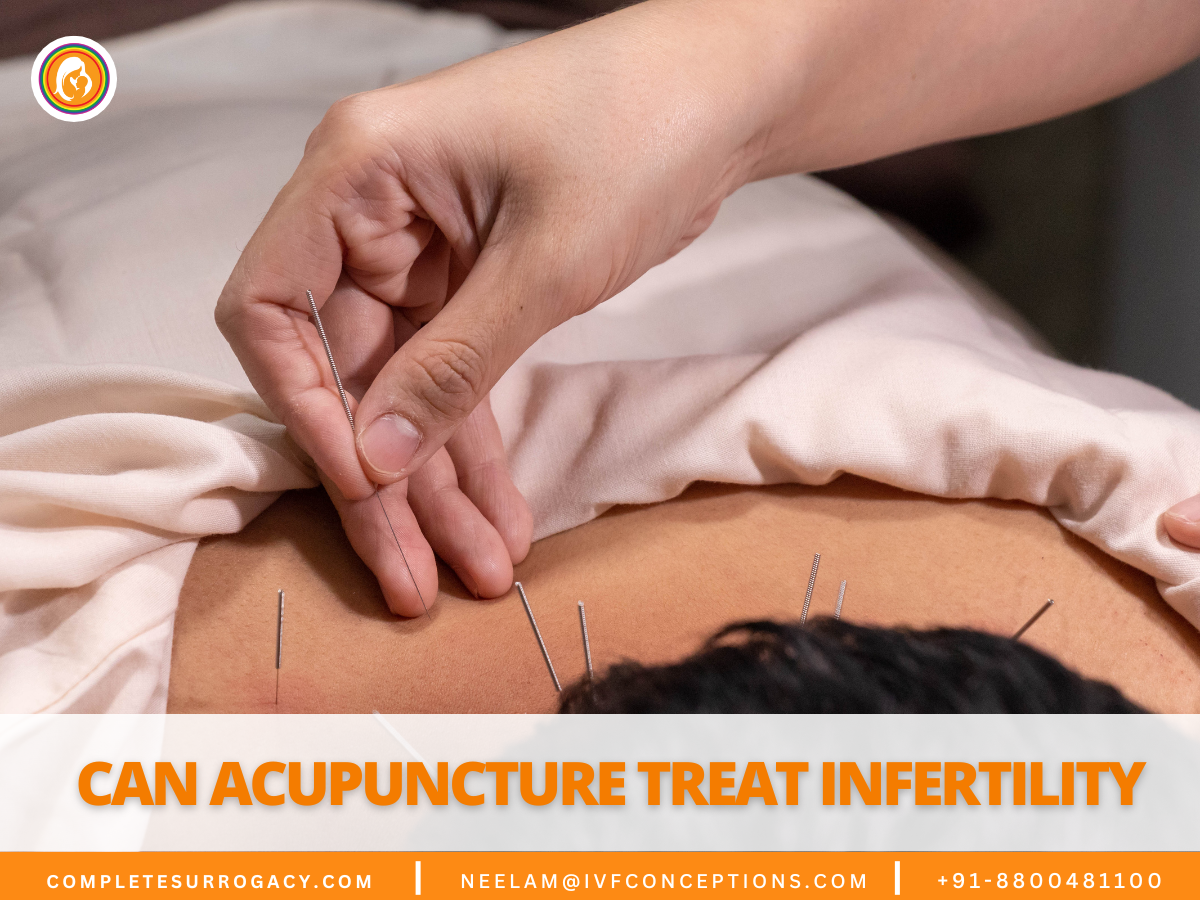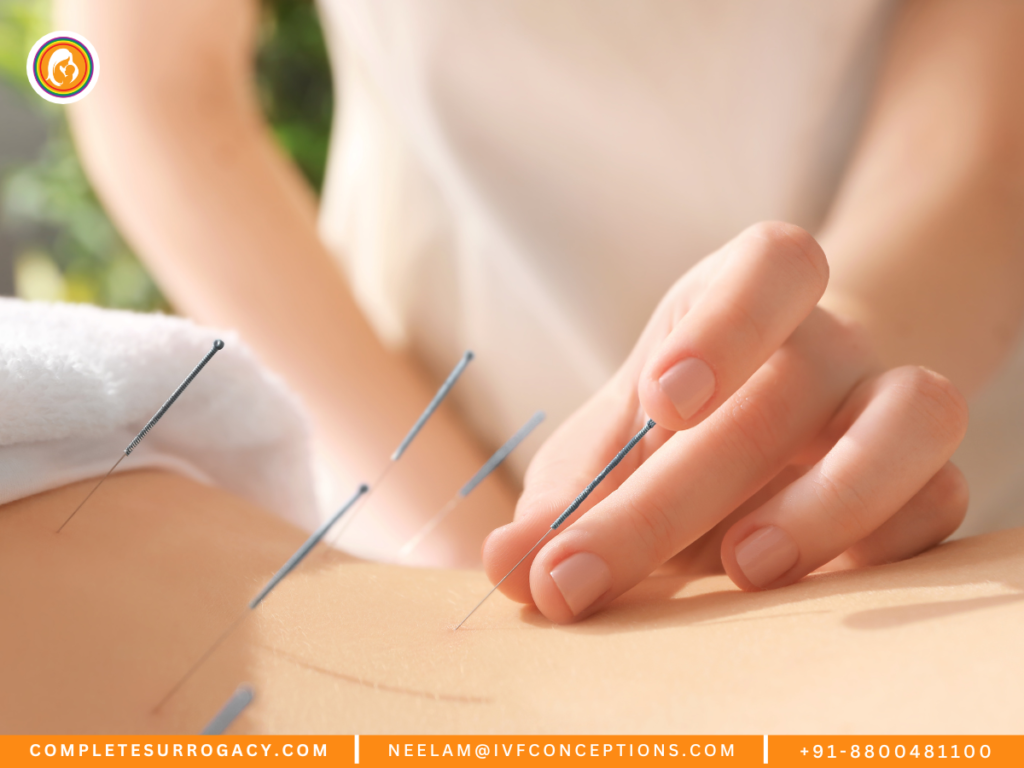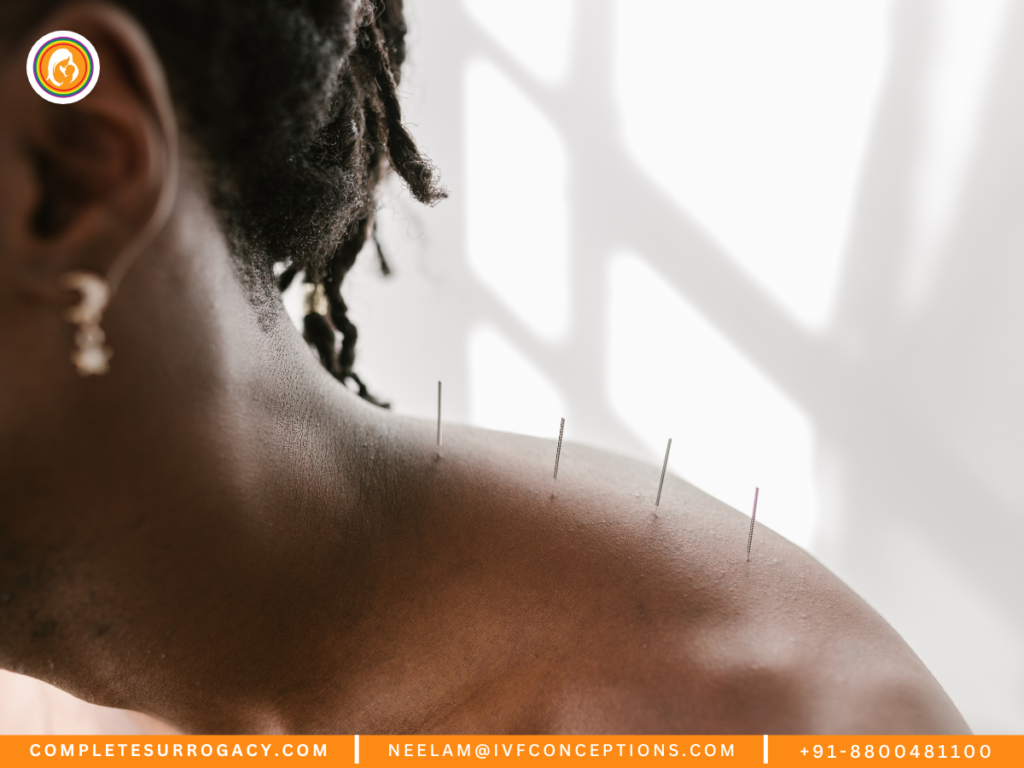Can Acupuncture Treat Infertility? A Comprehensive Guide

Can Acupuncture Treat Infertility? A Comprehensive Guide
Infertility affects approximately 1 in 100 women aged 15 to 44 in the United States, according to the Centers for Disease Control and Prevention (CDC). While medically established Assisted Reproductive Techniques (ART) like IVF, IUI, ICSI, egg donation, and surrogacy are well-documented treatments, some individuals explore holistic approaches such as acupuncture.
- Book an online appointment: Get a free online consultation.
- Call\W:+91-8800481100 Email:[email protected]
This guide delves into how acupuncture might influence fertility, exploring its efficacy, methods, and how it fits into modern fertility treatments.
More Resources to Read:
Surrogacy Guide for Surrogate Mothers
Surrogacy Guide for Intended Parents
How does the surrogacy process work
What is Acupuncture?
Acupuncture is a traditional Chinese medicine practice that involves inserting thin needles into specific points on the body, known as acupoints. This technique aims to balance the body’s energy, or “qi” (pronounced “chee”), which is believed to flow through pathways called meridians. By stimulating these points, acupuncture seeks to enhance the body’s natural healing processes and restore balance, which may improve various health conditions, including infertility.

How Does Acupuncture Work?
The acupuncture process involves:
- Assessment: Your acupuncturist will begin with a thorough health history review, including an examination of your tongue and pulse. This assessment helps in determining your specific needs and creating a tailored treatment plan.
- Needle Insertion: Fine, sterile needles are inserted into specific acupoints. The needles are typically left in place for 15-30 minutes. Most patients report minimal discomfort, though some may experience a slight pinch or tingling sensation.
- Treatment Frequency: It is generally recommended to start acupuncture sessions 2-3 months before beginning fertility treatments like IVF or IUI. Regular sessions (1-3 times a week) are often suggested to achieve optimal results.
The acupuncture process involves:
| Step | Description |
| Assessment | Review of health history, examination of tongue, pulse, and possibly additional physical exams. |
| Needle Insertion | Fine, sterile needles are inserted into specific acupoints. Needles are usually left in place for 15-30 minutes. |
| Treatment Frequency | Typically recommended 2-3 times per week, starting 2-3 months before fertility treatments. |
The Philosophy Behind Acupuncture
Acupuncture is rooted in Traditional Chinese Medicine (TCM), which emphasizes the balance of qi, yin, and yang within the body. According to TCM, illness arises from disruptions in the flow of qi. By restoring this flow through acupuncture, the body’s natural healing capabilities are activated. This ancient practice views health as a state of balance, and infertility is often seen as a disruption in this balance.
How Can Acupuncture Influence Fertility?
Benefits of Acupuncture for Fertility
| Benefit | Description |
| Regulation of Hormones | May help balance hormones, regulate menstrual cycles, and support ovulation. |
| Enhanced Blood Flow | Improves circulation to the uterus and ovaries, supporting reproductive health. |
| Stress Reduction | Promotes relaxation and reduces stress, which can positively affect hormonal balance. |
| Alleviation of Side Effects | May help mitigate side effects of fertility medications, such as nausea and mood swings. |
Acupuncture is employed to address various fertility issues and can potentially offer benefits for those undergoing ART. Here’s how:
1. Regulation of Hormones
Acupuncture may help in balancing hormones, which is crucial for regulating menstrual cycles and ovulation. This can be particularly beneficial for conditions such as Polycystic Ovary Syndrome (PCOS) and irregular menstrual cycles.
2. Enhanced Blood Flow
Improved blood circulation to the uterus and ovaries may enhance reproductive health and support the implantation process during IVF.
3. Stress Reduction
By promoting relaxation and reducing stress, acupuncture can indirectly support fertility. Stress is known to affect hormonal balance and overall reproductive health.
4. Alleviation of Side Effects
Acupuncture might help mitigate some side effects of fertility medications, such as nausea and mood swings.
Research and Evidence
The effectiveness of acupuncture in treating infertility is still a subject of ongoing research. Here’s a summary of recent findings:
| Study | Findings |
| 2017 Study | Insufficient evidence to support the use of acupuncture as a standalone treatment for infertility in women with PCOS. |
| 2018 Study | No significant difference in live birth rates between women receiving actual acupuncture and those receiving sham acupuncture during IVF cycles. |
| 2016 Review | Mixed results for male fertility; no strong conclusions on the efficacy of acupuncture. |
- 2017 Study: A review of studies on PCOS found insufficient evidence to support the use of acupuncture as a standalone treatment for infertility in women with this condition.
- 2018 Study: Research comparing acupuncture with sham acupuncture (placebo) during IVF cycles found no significant difference in live birth rates between the two groups.
- 2016 Review: Studies on male fertility and acupuncture showed mixed results, with no strong conclusions supporting its efficacy.
While some studies suggest that acupuncture might improve outcomes for specific fertility issues, the overall evidence remains inconclusive. It’s important to consider acupuncture as a complementary therapy rather than a primary treatment.
Risks and Side Effects of acupuncture in the fertility
Acupuncture is generally safe when performed by a trained professional. However, potential risks include:
- Bruising and Soreness: Some patients may experience minor bruising or soreness at the needle insertion sites.
- Infection Risk: Using non-sterile needles can pose an infection risk, though this is rare with trained acupuncturists who use disposable needles.
- Pneumothorax: There is a minimal risk of a needle causing a pneumothorax (collapsed lung) if inserted deeply into the chest or upper back.
- Bleeding Risks: Patients on blood thinners should inform their acupuncturist as they may be at higher risk for bleeding.

How to Choose an Acupuncturist
When selecting an acupuncturist, consider the following:
- Certification: Ensure the acupuncturist is certified by the National Certification Commission for Acupuncture and Oriental Medicine (NCCAOM) or the American Board of Medical Acupuncture (ABMA).
- Specialization: For fertility concerns, look for practitioners who specialize in reproductive acupuncture and have experience with fertility patients.
- State Licensure: Verify that the acupuncturist is licensed to practice in your state, as requirements vary.
When selecting an acupuncturist, consider the following:
| Criteria | Description |
| Certification | Ensure certification by the National Certification Commission for Acupuncture and Oriental Medicine (NCCAOM) or the American Board of Medical Acupuncture (ABMA). |
| Specialization | Look for practitioners specializing in reproductive acupuncture with experience in fertility issues. |
| State Licensure | Verify that the acupuncturist is licensed to practice in your state. |
More Resources to Read:
Infertility Treatment and Surrogacy Process
9 Factors To Improve IVF Pregnancy Rate
International Surrogacy Options Worldwide
Surrogacy Guide for Surrogate Mothers
Conclusion
While scientific evidence on acupuncture’s effectiveness for infertility is mixed, some individuals report positive outcomes. For instance, a case study highlighted a woman in her late twenties with PCOS who experienced a successful pregnancy after incorporating acupuncture into her fertility regimen. While her success might be attributed to various factors including lifestyle changes and acupuncture, it underscores the potential benefits of a holistic approach.
If you are considering acupuncture as part of your fertility treatment plan, consult with your fertility specialist to discuss its potential role. Remember, acupuncture should complement, not replace, conventional fertility treatments.
If you’d like to learn more about IVF, Egg Donation, or surrogacy services globally, check out the rest of our website at Complete Surrogacy Agency. We offer legally secure and affordable surrogacy consulting services for FREE.

FAQs for acupuncture for infertility treatment
1. How long does an acupuncture session last?
An acupuncture session typically lasts between 20 and 30 minutes, with the needles being left in place for this duration.
2. Is acupuncture painful?
Most patients experience minimal discomfort. The sensation is often described as a slight pinch or tingling. Some may experience minor bruising or soreness.
3. How often should I undergo acupuncture treatments?
For fertility issues, acupuncture is generally recommended 2-3 times a week. The frequency can be adjusted based on individual needs and treatment goals.
4. Can acupuncture be used alongside conventional fertility treatments?
Yes, acupuncture can be used as a complementary therapy alongside conventional fertility treatments like IVF or IUI.
5. How do I find a qualified acupuncturist?
Look for acupuncturists certified by NCCAOM or ABMA and ensure they are licensed in your state. Specialization in reproductive health is also beneficial.

About Author:
Neelam Chhagani, MA (Counselling Psychology), PGD (Mental Health), and Holistic Infertility and Third-Party Reproduction Consultant.
Member of the European Fertility Society (EFS) and European Society of Human Reproduction and Embryology (ESHRE), Best Surrogacy Blogger for surrogacy and infertility treatment.
Highly esteemed, authoritative, and trusted professional with a 15-year of experience in international surrogacy and fertility medical tourism. Advocate for Secure, Legal, and Affordable International Surrogacy Globally.















I was introduced to Neelam by a friend who worked with Neelam for surrogacy. Neelam is absolutely wonderful. I am a single male and the journey to fatherhood is not that easy. Neelam connected me to a program ideal for my circumstances. She was with me throughout the pregnancy providing advice and guidance along the way. I am so grateful I found her and am thrilled today that I have a beautiful daughter. I highly recommend Neelam to anyone who is on a journey to become a parent. Having a child has changed my world for the better. I wish others success with their own journey and recommend you connect with Neelam to find a path that is best for you.
SA (USA)